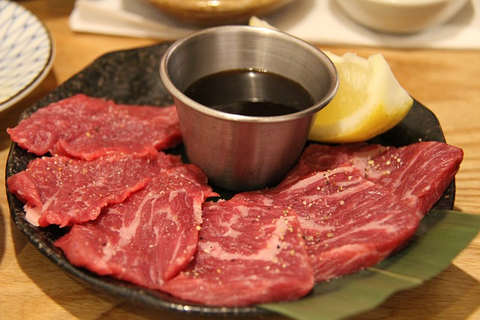
American Wagyu beef is produced in the United States using genetics originating from Japanese cattle. Japanese wagyu beef is known for its high marbling levels, resulting in incredibly tender and flavorful meat.
Wagyu cattle were first brought to the United States in the 1970s; it wasn't until the 1990s that American farmers began to breed them specifically for meat production. The breed has since become popular among American ranchers, who have used traditional Japanese breeding methods and modern technology to produce a high-quality beef product.
The Characteristics of Wagyu Bred Beef
The key characteristic of American Wagyu beef is its high marbling content. Marbling refers to the small flecks of fat that are dispersed throughout the meat, and it is this fat that gives the meat its rich flavor and tender texture.
American Wagyu beef typically has a marbling score of 6 or higher on the Beef Marbling Standard scale, which is considered "moderately abundant" to "abundant."
Another characteristic of American Wagyu beef is its high monounsaturated fat, considered a "good" fat. This means that it can help to lower cholesterol levels and reduce the risk of heart disease. Additionally, American Wagyu beef is rich in other nutrients such as protein, zinc, and iron.
How is Wagyu Beef Eaten?
One of the most popular ways to enjoy American Wagyu beef is through a traditional Japanese dish called "shabu-shabu." This dish involves thinly slicing the beef and cooking it quickly in boiling water or broth. It is then dipped in various sauces and served with vegetables and rice. American Wagyu beef can also be enjoyed in traditional cuts, such as steaks, burgers, and roasts.
Wagyu beef is a unique and high-quality product known for its rich flavor, tender texture, and high marbling content. It is an excellent choice for anyone looking to enjoy a luxurious and delicious meal.

Is American Wagyu Beef for everyone?
One major complaint is the amount the meat shrinks when cooked. Because of the intensely high inter-muscular fat content, a Wagyu cut will decrease in size as this high-fat renders out of the meat. Ground beef is especially hard to produce from full blood wagyu as the fat vs. meat content is rarely within standard market ranges.
Also, though most avid beef-eaters universally enjoy Prime grade steaks, Wagyu's fat content is over what many find palatable. Because of these two factors, most people consider this beef a "special occasion" meat, having it a few times a year and mainly in a restaurant experience.
Is there an in-between option?
Can the meat can be similar to Japanese and American wagyu beef but without the over-saturation of white color? Can there still be intense marbling raised with strict standards but still traditional enough to eat on a daily basis?
Yes! There is a way to finish a cow to mimic Kobe style meat with highly prized, exclusive cuts without the overly buttery texture.
Raising cows longer produces a richer flavor
Long-finished, also called "pasture-aged" or "live-aged," is a practice that involves raising the animal for longer than what is conventionally done. While "Vaca Viejo" in Spain can push the extremes of animal life span (14 years in some cases), Pasture-Aging is closer to 3-4 years.
This allows the animal to slowly imbed fat in the muscle, almost always arriving at Prime grade with some cuts resembling Wagyu - such as the Flat Iron steak and Briskets sold by Pumpkin Creek Ranch.
While pasture-aged animals can replicate some of the traditional Wagyu fat content, it can also mirror the nutrient makeup if the cows are fed flax seed a few months prior to processing the meat (this increases the Omega 3 level).
So which is best - Wagyu Cattle or traditional American breeds?
They all have their place! Japanese wagyu, kobe beef, and American wagyu steaks are all highly prized options but are often enjoyed more on special occasions, cooked by expert chefs at fancy restaurants. More traditional breeds, such as Red Angus, can also produce prized, quality steak, roasts, and ground beef, if raised for double the lifespan of traditionally finished beef.
Unlike American wagyu steaks, traditional American breed beef is a good go-to "every occasion" meat; still rich in beefy flavor but without being too overly saturated in fat, like true Kobe beef.

Steaks from long-aged Red Angus cattle are some of the richest tasting, juicy cuts, but unlike American Wagyu or Japanese cattle, the meat can grade at prime without being so fatty the entire cut is white.
Also Read:
What is Regenerative Agriculture?
Flax Seed and its Effect on Meat
Pumpkin Creek Ranch is a premium beef brand specializing in flavor through slow growth and long-lifespan finishing. Whether using regenerative practices to elevate soil health or growing the entire diet of our herd (no outside inputs), we take no shortcuts in crafting our consistent flavor profile. We believe that beef can be nutrient-dense, tender, flavorful, and well-marbled without sacrificing the health of the soil, animal, or our customers.
